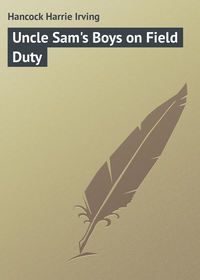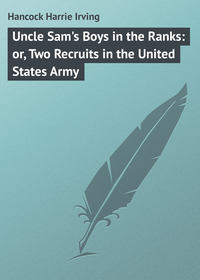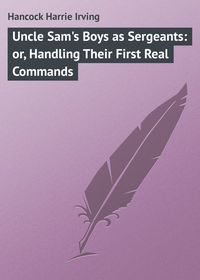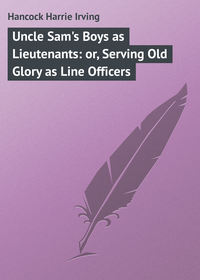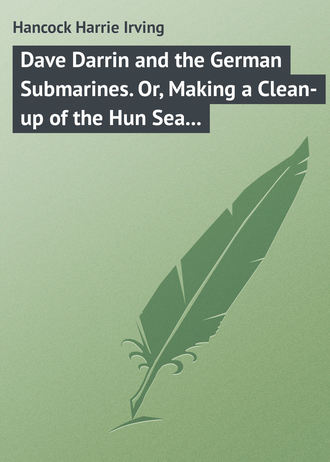 полная версия
полная версияDave Darrin and the German Submarines. Or, Making a Clean-up of the Hun Sea Monsters
Knowing his speed and the length of his own craft Dave timed the instant just right, then shouted:
“Let go the bomb!”
A depth bomb was instantly released over the stern.
By the time that it exploded the speeding destroyer was safely out of the way of any danger from its effects. A huge, thick column of water rose, as if overboiling from a monster pot.
“Put about and go back to observe,” Darrin directed, nodding to the watch officer.
Even before they were fully about an exultant hurrah came from a lookout forward.
“Was she hit, lookout?” Dave shouted.
“‘Hit’ is the right word, sir,” came the response. “On that spot, at this minute, there’s more oil than water.”
In another instant Dave also beheld the big, spreading mass of oil. There was no need of investigating further. He turned in search of other enemy craft.
Ten minutes passed without sight of one near enough to engage Darrin’s attention. It would not be good judgment for the “Logan” to go hunting in some other craft’s territory.
At last, a thousand yards away, a conning tower, with only a stump of a periscope remaining, rose through the waves. Time was, in the war, when a shattered periscope obliged a submarine to choose between rising to the surface and sinking, but later periscopes were so adjusted that they could be shot away without imperilling the safety of the underseas craft. This emerging craft showed also a damaged tower, and the rising had to be of the quickest order.
“I hope that chap isn’t going to surrender,” muttered Dave, as he ordered the “Logan” headed straight toward the sea monster. “It takes too long, in a fight like this, to receive a surrender and remove the prisoners.”
In a very few seconds, however, the enemy relieved his apprehensions. Beatty fired two shots, both of which went a few feet wild. In that time the German commander rushed men out to the bow gun. Though her tower was damaged, the craft could still fight on the surface.
One after another eight German sailors leaped out to the deck, throwing their six-inch forward gun into fighting position.
R-r-r-r-rip! Rat-tat-tat-tat-tat! Two machine guns on the “Logan” were turned loose. One German sailor, then another, was hit, fell and rolled from the wet platform into the sea.
Bang! roared out Lieutenant Beatty’s gun, but the shot did nothing more than tear away a part of the conning tower’s top.
Still the machine guns played upon that Hun gun-crew. Three more of the enemy were laid low, two of them rolling overboard into the sea.
A flash leaped from the German gun. A swell, lifting the bow of the submarine at that instant caused the shell to go screaming overhead, so close to the bridge that the three officers there “ducked” without realizing that they were doing so.
Aiming for the German gun, Beatty sent in a shell that pierced the top of the hull twenty feet ahead of the gun.
“Cooler, old chap!” Lieutenant Beatty breathlessly adjured himself, and spent perhaps half a second more in the sighting this time.
Just before he fired, the Huns let go with their big piece again. The shell struck the “Logan’s” foremast, damaging it, though the mast did not go overboard.
Two sailors on lookout, hit by flying pieces of steel, were hurled into the air. One dropped to the deck, a hopelessly mangled mass of torn flesh; the other seaman was knocked overboard.
Dave turned to look at that wreck of a human being as it struck the water. He knew there was no life in the man, so gave no order for recovering the body.
Down below sailors sprang to lift the dead man, who had dropped there, on to a stretcher. They carried him below, to be buried later.
Beatty did not delay his firing an instant. This time the shell struck at the base of the enemy’s tower. A fragment of the exploding shell must have hit one of the German gun-crew, for a man fell on his face and rolled overboard. However, that mattered little in the fight, for still Hun reinforcements came through what was left of the conning tower.
“I seem able to hit everything but that gun or the water-line,” fumed Lieutenant Beatty, enraged with himself.
Hit though the tower had been, and though, also, three or four members of the Hun crew must have been killed in those hits, the steering gear of the submarine was still left and the grim craft was maneuvered in a way to challenge admiration.
Considerate of the feelings of the officer with the forward guns, Darrin had refrained from giving one order, but now passed the order to the machine gunners to concentrate their fire on the enemy hull at the water line.
The water alongside the submarine began spurting in tiny jets. This sieve-like riddling would presently settle the fight, unless the Hun gunners got in just one shot where it would tell best. The fight, therefore, was not yet won by the destroyer.
“Fire!” ordered Beatty, in forced calm. Then, all in an instant, that young naval lieutenant threw up his hands.
CHAPTER XI – A TRAP AND ITS PREY
Not that he was hit. Oh, no! Beatty’s last shot had done its work well. In the enemy’s hull, at the water-line, a great, jagged hole had appeared.
Responding to the inrush of water the submarine heeled. And then a strange sight was witnessed. Just as the breathless sailors on the “Logan” looked for the underseas craft to plunge under the waves she did something very different.
How it happened no one can ever tell; the cause none can guess with anything like certainty.
Did a chorus of despairing shrieks come from the bowels of that dying sea monster? There were those on the “Logan” who were sure they heard cries of terror.
Instead of sinking, the submarine continued on over – and turned turtle. Her dripping hull glistened in the forenoon sun!
It was too much for the tensed nerves of the American sailor men.
“Hurrah!” they let loose. “Hurrah! Hur – ”
“Stop that cheering!” rose Darrin’s heaviest tones over the tumult. “The enemy are dying.”
“They’re only Huns!” answered a voice from below.
But the cheering died away and Dave’s voice carried far as he answered:
“I know they’re only Huns, and a bad lot, but they fought us well. We’ll cheer for the victory later, but not for the fate of men who are dying there.”
Darrin then gave the order to steam in close and to stand by to rescue any swimmers who might appear in the water.
Twice the “Logan” circled the overturned enemy. Save for two of the men who had been shot away from the submarine’s gun platform, and who were dead, none of the enemy were to be found.
Now it was that the young commanding officer had an opportunity to turn about and see how it was faring with the other American vessels.
All firing had ceased. The fleet was proceeding on its way. Darrin was some distance astern of the rearmost ships of the troopship fleet.
“Men, it looks as if our fight were over for the present,” Dave called down in hearty cheery tones. “From the bridge we cannot see the head of the fleet, nor can we hear the sound of firing.”
Accordingly all speed was jammed on. The “Logan,” saluting the rearmost scout of the destroyer flotilla, steamed on to return to her own position in the line. As he passed a sister ship Darrin signalled:
“How many transports lost?”
“Only the ‘Castle City,’ we understand,” came the response.
“Any lives lost?”
“We don’t know.”
“We lost two men.”
“Condolence,” signalled the rearmost rear-guard craft.
“Any naval vessels lost?” Dave inquired.
“None that we know about.”
“How many enemy submarines sunk?”
“Several; don’t know the number,” replied the other destroyer.
“Now you may cheer in earnest, if you want to,” Darrin shouted down from the bridge as the news was passed around.
And right royally did those jackies cheer. The rescued soldiers were now permitted on the “Logan’s” deck, and contributed their own quota of cheers.
Dan came up to the bridge with a paper in his hand.
“The commanding general of the Army division will be asking for the names of soldiers on the various ships of the naval fleet who were rescued from the ‘Castle City,’” Dalzell explained. “So I’ve taken the names of all the Army people we have aboard the ‘Logan.’ Here’s the list. It foots up seventy-seven enlisted men, with two officers.”
“Good enough,” rejoined Dave. “Keep the list until called for.”
No sooner was the destroyer within signalling distance of the transport that carried Major-General Burton, than a wigwagged demand came for that list. It was received and checked up.
The American loss, to the Army, had been one troopship, one officer and five enlisted men; to the Navy, with no ships lost, four men had been killed, including the two on the “Logan,” and one seaman had been wounded.
The German loss in officers and men could only be guessed at. But it was definitely known that thirteen of the Kaiser’s submarines had been sent to the bottom.
“However,” Lieutenant-Commander Darrin observed, when he and his executive officer had considered the report, “we are not yet through the Danger Zone. We may have another battle stiffer than the one just concluded.”
“Tell me something!” begged Danny Grin, his eyes gleaming. “Out of the thirteen pests sunk four are placed to the credit of the ‘Logan.’ Are we the people – or something like it – in this morning’s job?”
“Now run along,” Dave advised laughingly, “and don’t allow your head to be enlarged, either on your own account or your ship’s. The best we can claim, Danny-boy, is that we were very fortunate. As officers and men we’re no better than are to be found all through the Navy.”
“There’s one question I’d like to ask you before I trot,” Dan insisted, with one of his famous grins.
“What is it?”
“It may have some bearing on future fight engagements,” Dalzell continued, his grin slowly fading.
“When will you find time to tell me what the question is?” Darrin asked smiling.
“How many submarines were probably engaged this morning?”
“I haven’t any more idea than you have. I was too fully occupied with our own affairs to be able to watch the whole field.”
“But that document led us to believe that about sixty would be engaged,” Dalzell continued. “The question is, how many submarines were pitted against the fleet this morning?”
“I don’t know how many,” Dave admitted. “But I see your point. If the entire sixty were not engaged – and I doubt if any such number attacked – then we must look for a second mass attack.”
“Yes, sir,” nodded Dalzell, now wholly the serious, subordinate naval officer.
“The thing is worth taking up,” said Dave. “I’ll signal Captain Rhodes on the flagship of the destroyer flotilla and find out what he has to say.”
Back came Captain Rhodes’ answer within a minute:
“No accurate figures at hand. Believe enemy numbered something like thirty craft. Extreme vigilance needed until we reach port.”
“There you are,” Dave said, when the signal had been read. “Take command, Mr. Dalzell, and be the sharpest little sailor on the ocean. I’m going below on another matter.”
Once at his desk in the chart-room Dave sent for Seaman Ferguson.
“Does Seaman Jordan smoke cigarettes?” asked Darrin.
“Yes, sir.”
“Is he really addicted to them?” Dave continued.
“Is he, sir?” exclaimed Ferguson. Then: “Pardon me, sir, for answering like that. Jordan smokes his head off when he can get the chance and has enough of the pesky things.”
“Thank you,” Dave nodded. “That is all, except the caution to say nothing to any one about my question. Send Reardon here.”
Big, red-faced, with huge hands, a deeply bronzed skin and a sly, merry twinkle in his eyes, Reardon was a sailor of the best type. Dave knew the man’s loyalty and shrewdness, as well as Reardon’s great faculty for holding his tongue at need.
“Reardon,” directed Dave, “place a chair here at the desk and write a note at my dictation with this pencil.”
“Aye, aye, sir! Ready,” announced Reardon, taking his seat and picking up the pencil in his big right hand.
“Write this,” said Dave. “‘Sorry for you. Looks like you got a raw deal. I’ll be glad to help you, if you want cigarettes or anything. Don’t nod or speak to me, but wait for your chance to slip this paper back to me. Write on it what you’d like.’”
“Now,” Darrin resumed, as the sailor looked up, “go below and stand where the guard at the brig can see you, but don’t let your shoes make enough noise for Jordan, who’s in the brig, to hear you. Signal to the guard to stroll slowly in your direction. When he reaches you tell him that you are ordered by me to slip a note to Jordan, but that the guard is not to mention the fact to any one. Tell the guard, from me, to stand so as to give you a chance to slip the note. Then, twenty minutes later, you are to get down there again and give Jordan a chance to hand you his reply. Slip this pencil in with the note.”
“Aye, aye, sir.”
Not even his eyes expressing any question or curiosity, Reardon left the chart-room. Going below he stepped into the passage-way that led to the brig. Cat-footed he walked along until he caught the eye of the marine guard. From the point where he halted Reardon was not visible to any one standing at the grated steel door of the little, cell-like brig in which serious offenders against discipline were confined until tried or released.
Reardon’s first signal was to place a warning finger over his lips. Then he brought his hand up to a smart salute, next pointing above, which the marine at once understood to mean that Reardon was there on an errand for some officer. Next by stepping softly, and motioning with his hand to the floor, and then to his own position, he signified that he wished the marine to come to him.
No fool was Fitch, private in the Marine Corps, which contains few if any fools. So well did he understand that the occupant of the brig had no suspicion that his guard was looking at any one beyond. Then Private Fitch took a few turns in the passageway, after which, yawning slightly, and humming softly to himself, he strolled along the passageway until he reached the big sailor.
“I’ve orders from Lieutenant-Commander Darrin to slip a note and a pencil to Jordan in the brig,” whispered Reardon. “You’re not to see me. Bye and bye you’re to give Jordan a chance to write an answer, which I’ll come back and get.”
“Lieutenant-Commander Darrin’s orders, eh?” whispered the marine, eyeing the big sailor keenly.
“Which the lieutenant commander gave me himself,” nodded Reardon. “And you’re not to say anything about the matter.”
“Go ahead, when you’re ready,” nodded Private Fitch, turning and strolling back.
A full two minutes Reardon waited. Then, making no further effort to walk softly, the big fellow stepped down the passage way.
“Looking for a berth in the brig?” asked Fitch, jocosely.
“Now, why should I?” demanded Reardon. “And me a good conduct man. ’Tis more likely you’ll get a place there yourself.”
“Not me,” returned the marine. “There are only six of us and a corporal on board, and we’re all needed. You know, Reardon, marines are important people, since one marine is the fighting equal of three sailors.”
“Is it so, now?” demanded Reardon, in an amused tone, as he halted before the brig door. “What time did ye get up this morning, Mister Fitch?”
Pacing the floor behind the barred door with the restless step of a caged animal, Seaman Jordan only scowled at the bantering pair. But Reardon had halted with his back close to the steel bars. In one hand behind him was a pencil with a scrap of paper folded around it.
Jordan hesitated. He was afraid of some trap, but his position was desperate. He was accused of treason. Perhaps this big sailor was a friend in need. After a moment or two of hesitation, Jordan prolonged his walk until it brought him close to the bars. Then, while Private Fitch was glancing down at the lock of his rifle, Jordan stealthily grasped note and paper and dropped them in a pocket.
Reardon remained for a few moments more, bantering the marine good-humoredly. Soon after Reardon had gone, the marine strolled slowly out of sight. In the brief interval before he was back Jordan hastily scanned the note. It looked utterly innocent. Turning the paper over, Jordan hurriedly wrote:
“Cigarettes and matches, as soon as you get a chance. There are times when the guard isn’t here. When in action, and all hands at quarters, there’s a long chance to smoke.”
Twenty minutes later Seaman Reardon returned, “joshed” the marine briefly, and secured pencil and paper from the prisoner.
Seaman Jordan waited a long time for his cigarettes and matches. For Dave Darrin, as soon as he had received the paper and Reardon had saluted and gone out, went to the safe and took from it the paper that had been fished out of the bottle rescued from the deep. For some minutes Darrin compared the writing on the two pieces of paper.
“Of course, one is in German script, and the other in English,” Dave communed with himself. “But let us see what Phelps thinks of it.”
Ensign Phelps, who was a bit more than an amateur handwriting expert, came at request and scanned both papers. Then he went out, returning with a magnifying glass with which he examined both writings.
“Of course the two different styles of script make the comparison difficult,” Mr. Phelps declared. “Still, I am certain a better qualified expert than I will say that the same hand executed both writings.”
“Then Jordan’s last chance is gone, I’m afraid,” replied Dave gravely, as he took the two sheets and filed them carefully in the safe. “Before, there was a chance for Jordan to get off at his trial by court-martial, for, while Seaman Ferguson was morally certain that Jordan dropped the bottle overboard, he would not be able to swear positively to it. If this note given by him to Reardon, however, proves Jordan of being the writer of both sheets, then his conviction as a traitor looks pretty certain. Phelps, these are the most serious days in the history of our great country. If any man in the American uniform is a traitor to our Flag and cause, then I want to see him punished.”
“That would mean death at the hands of a firing squad,” mused Ensign Phelps.
“Death before a firing squad,” Darrin assented gravely. “It is the only punishment for such a crime!”
CHAPTER XII – DAVE HUNTS A BIGGER FIGHT
Of much less beam for her length than the average yacht, the “Logan” was rolling from side to side at a dizzy angle when Dave Darrin, after a nap of an hour and a half in the chart-room, turned out.
The wind had freshened; spray dashed over the decks and water flooded the scuppers. Every now and then a spurt of water raced across the bridge as the destroyer heeled over in that roughening sea.
Dave had pulled on his rubber boots, strapping the hip extensions high up. His sheepskin coat was fastened up tightly under his chin, and the collar turned up over the lower part of the knitted helmet that he drew over his head.
Thus covered and concealed until his mother would not have known him had she encountered him unexpectedly, Dave stepped out on deck, clumsily clambering the steps to the bridge, one hand holding tightly to the hand-rail. Dalzell was up there, standing not far from Lieutenant Curtin. Forward, up in the bow, looking half drowned, paced an ensign whose night glass was not long at any time from his eyes.
On the superstructure amidships another officer paced, and still another on the deck astern.
There was little sleep for any officer. Not one of them but was aware that at any instant the lurking foe might strike, and then would begin a desperate, tragic game of blind man’s buff over the slashing, spray-topped waves.
A shaded light threw a confined ray on the bridge compass. Dave barely glanced at this latter instrument, for had not Dan been there while the young commander slept?
“Nothing seen, sir; some signals – that’s all,” was Dalzell’s terse report.
No grin appeared on Dan’s face now. It had been a tense vigil for him.
“Go below and get some sleep,” urged Dave.
“Don’t need any,” Dalzell declared stubbornly.
“It’s an order, then, Mr. Dalzell,” Dave answered briefly.
Grumbling, Dan took a final look into the night, then slowly clambered down the steps.
“I’m aware, sir, that an attack may be tried at any minute,” said Lieutenant Curtin, “but don’t you believe that it will be postponed until after daylight?”
“Yes,” Darrin made reply. “And if we’re to have an attack between here and port, I’d rather have it to-night. Neither troopship nor destroyer is showing lights, so the Huns couldn’t use their periscopes. They might, of course, use their sound devices, and launch torpedoes towards the sources of sounds, but that’s a clumsy and wasteful way of torpedoing an enemy. Attacking on a night like this, the only sure way would be for them to come to the surface. That would give us an ideal chance. With searchlights playing in every direction we’d pick up a lot of the submarines and hit them within the first minute and a half. No; unless for the novelty of the thing, the German commander won’t risk a night attack. Results for him are more certain just after dawn. I believe, as much as I believe anything, that the enemy’s submersibles are now waiting for us at the point where they figure that we will be at dawn.”
“It will be great to meet them at their convenience,” remarked Curtin, after a pause of a few minutes. “After what we did to them yesterday forenoon we know how we can rush some of ’em to the bottom, and leave the rest so far astern that they’d have to come to the surface to overtake our troop-ships.”
“We know what we did, but we don’t know that we can do it again,” Darrin retorted. “The greatest mistake that we can make is to become over-confident. That never pays when dealing with any enemy, and least of all when the Hun is the enemy. We got away yesterday, Curtin, but has it struck you that we may have met the inferior half of the underseas fleet that the enemy has concentrated against us? Yesterday forenoon’s work may have been play compared with the job that has been cut out for us. The surest way to lose a few destroyers, a few transports and thousands of soldiers and sailors, is for the naval officers with this fleet to let their confidence get the better of their alertness. Even in spite of our utmost watchfulness and best work, we may lose five thousand American lives before we reach port.”
“Maybe our country would fight better hereafter if we did,” muttered the younger officer. “A loss like that would serve to rouse Americans rather than to kill their fighting instinct.”
“But confidence in the Navy would be largely gone,” Dave rejoined. “At present the folks at home are whooping up the Navy. That’s because we’ve had such fine luck so far. Let us lose several thousand soldiers at sea and then see how much our home people would boost for the Navy. We’re judged by the goods we deliver in the form of results.”
Not all of this had been said in continuous conversation, for not once did either officer remove his gaze from the black waters around them. Dave and his junior officer had spoken by snatches as they came together.
Off to starboard, several hundred yards, the dimly defined shape of a huge transport appeared. The transport ahead of her, and the one behind her, had to be located by judgment rather than by vision.
“A fellow cannot help getting nervous out here – I mean nervous for the transports,” said Lieutenant Curtin, ten minutes later. “Before you came up, sir, there was a time when neither Mr. Dalzell nor I could see that nearest troopship at all.”
“Did you change your course?” asked Dave, with a smile.
“No, sir; I knew we must be right, for we had followed the course to a fine line. But it was uncanny, just the same – the knowledge that we must guard the transports, combined with the belief that they had slipped miles away.”
“Before you came across to this side of the ocean, Mr. Curtin, you were inclined to be a bit stout, weren’t you?” Dave quizzed.
“Nineteen pounds over weight, sir.”
“Cheer up! You won’t grow fat during this war.”
“I don’t care about loss of sleep, or anything,” declared the junior officer, earnestly. “I believe that I could get along without sleep, except when in port, if we could range the seas with a daily average of one enemy submarine sunk.”





